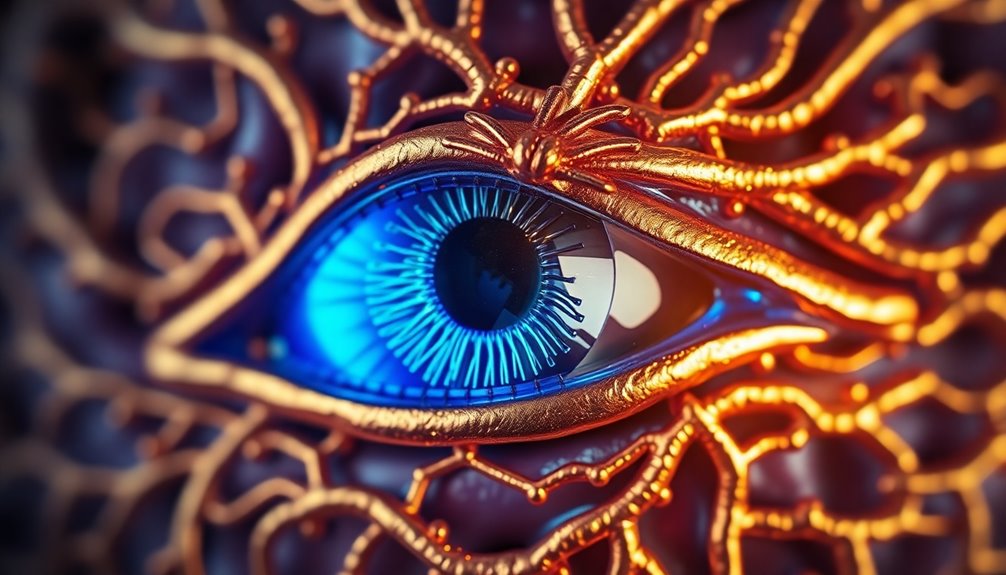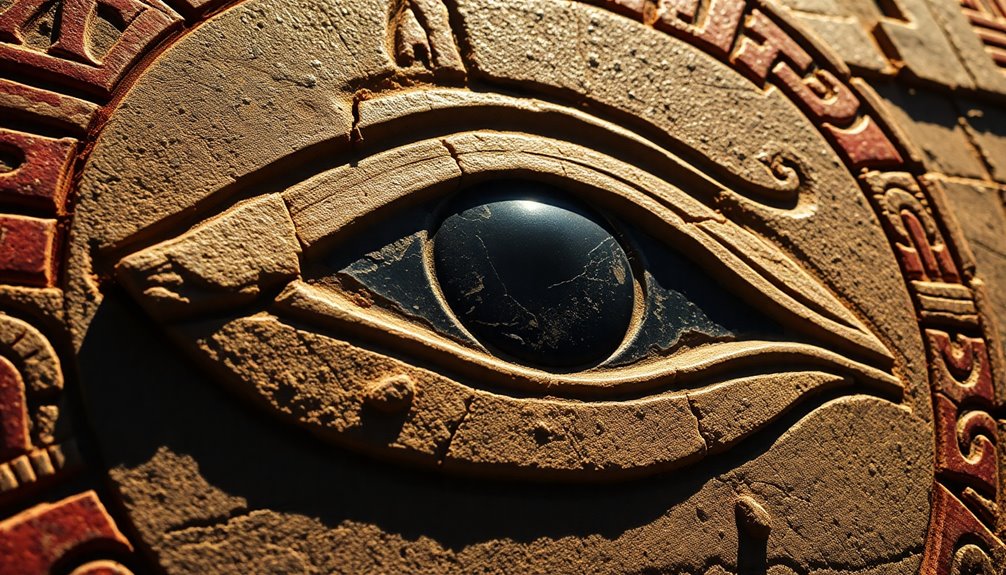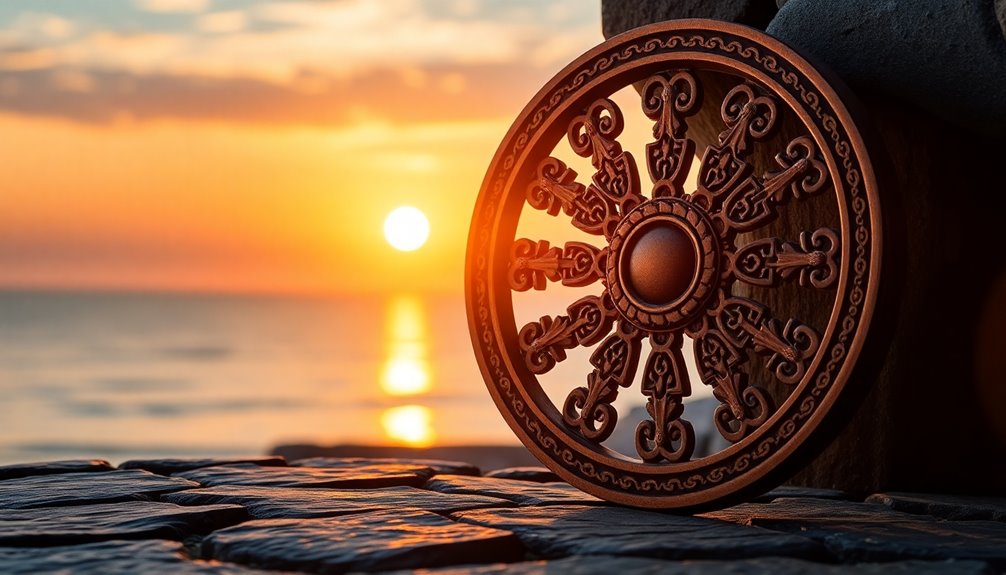The Eye of Horus connects deeply to brain functions, particularly the pineal gland, often called the "third eye." This tiny gland plays a vital role in regulating your sleep and mental health through melatonin production. Each element of the Eye symbolizes different brain functions, from thought to perception. As you explore this symbol, you'll uncover how ancient wisdom reflects modern neuroscience, linking physical health with spiritual awareness. The Eye of Horus emphasizes the balance of mind, body, and spirit, encouraging personal growth and holistic well-being. Keep exploring to discover how this ancient emblem can enhance your life.
Key Takeaways
- The Eye of Horus symbolizes healing and protection, representing various human senses and brain functions connected to consciousness and awareness.
- Each component of the Eye of Horus corresponds to sensory perception, integrating art and science in understanding human anatomy and its functions.
- The symbol's mathematical significance reflects the concept of imperfection and the cyclical nature of life, hinting at deeper philosophical insights.
- Activation of the pineal gland, often associated with the Eye of Horus, is believed to enhance spiritual experiences and intuitive abilities.
- Modern interpretations of the Eye of Horus promote mind-body-spirit interconnectedness, encouraging holistic approaches to mental well-being and personal growth.
Understanding the Pineal Gland
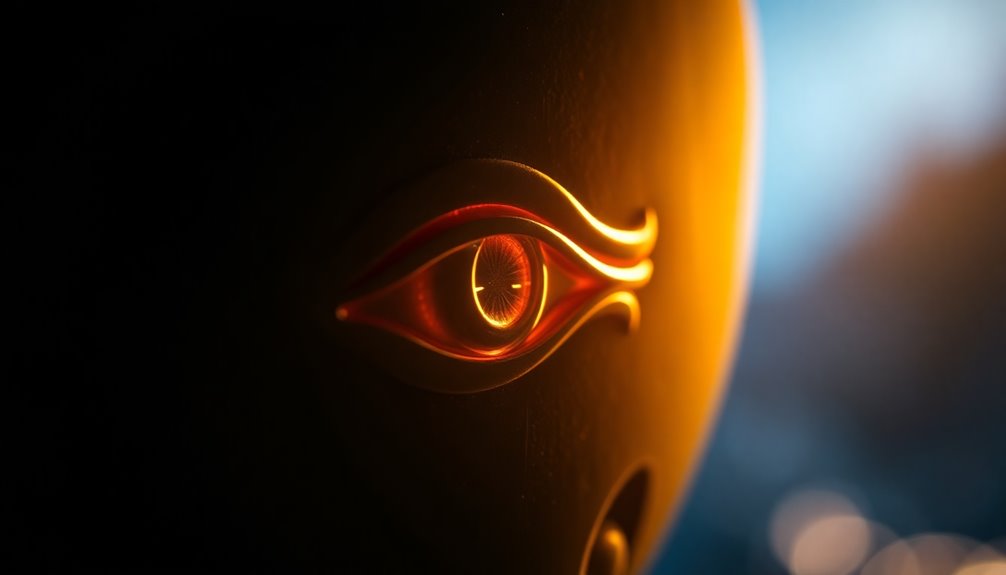
The pineal gland is a tiny yet powerful part of your brain, playing an essential role in regulating your sleep-wake cycles. Nestled deep within, this small endocrine gland produces melatonin, a hormone that signals your body when it's time to sleep. It responds to light cycles, ramping up melatonin production in darkness. This process is critical for maintaining your circadian rhythms and overall mental health.
When the pineal gland isn't functioning properly, you might experience sleep disorders, anxiety, or even cognitive decline. As a result, keeping it healthy is essential. Lifestyle factors like a diet rich in antioxidants, regular physical activity, and exposure to natural light greatly influence its performance.
Interestingly, the pineal gland has long been associated with spiritual concepts, often referred to as the "third eye." This connection ties it to notions of spiritual awareness and enlightenment, making it an ancient Egyptian symbol of consciousness and insight. Additionally, many spiritual traditions emphasize the importance of meditation practices, which can further enhance the health and function of the pineal gland.
Understanding the role of the pineal gland not only highlights its importance in regulating sleep but also its potential influence on your spiritual experiences and mental well-being.
Functions of the Pineal Gland
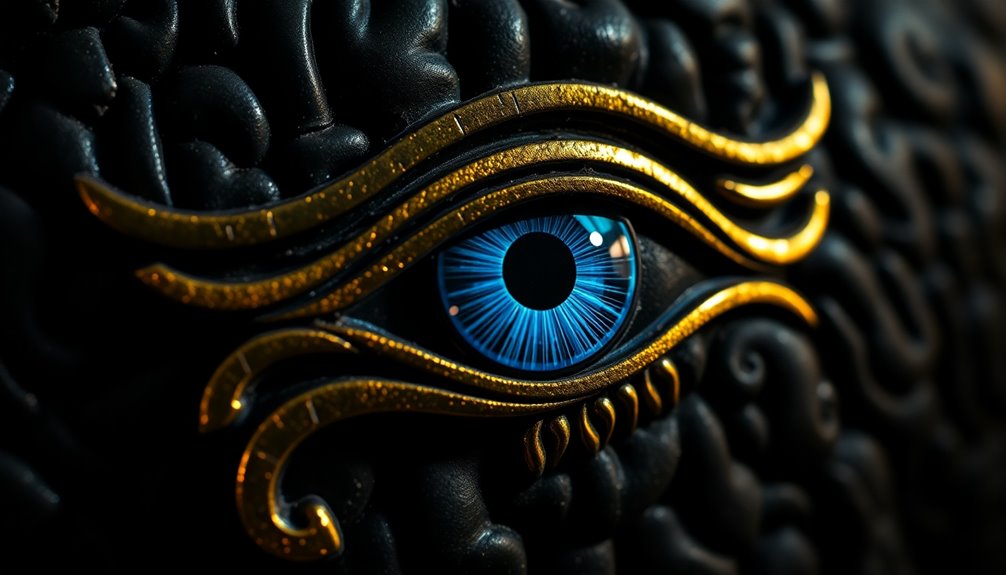
The pineal gland plays an essential role in regulating your circadian rhythms and producing melatonin, which helps control your sleep-wake cycles.
When darkness falls, it ramps up melatonin production, making you feel sleepy, and decreases it during daylight to wake you up.
Understanding how this tiny gland impacts your overall health can help you maintain better sleep and emotional balance.
Circadian Rhythm Regulation
Understanding how your body regulates sleep can truly enhance your overall well-being. The pineal gland, often called the "third eye," plays an essential role in managing your circadian rhythms. By producing melatonin, it helps signal your body when to sleep and when to wake. As light exposure decreases, melatonin production ramps up, encouraging sleepiness. Conversely, it drops with light, aiding in your morning wakefulness.
| Factor | Impact on Pineal Gland | Result |
|---|---|---|
| Natural Light Exposure | Stimulates melatonin regulation | Improved sleep quality |
| Antioxidant-Rich Diet | Supports pineal health | Enhanced cognitive function |
| Regular Physical Activity | Regulates circadian rhythms | Better mood stability |
| Screen Time Disruption | Impairs melatonin production | Sleep disturbances |
When your circadian rhythms are in sync, you enjoy better sleep quality and cognitive function. However, factors like shift work and excessive screen time can disrupt these rhythms, leading to melatonin imbalances. By taking steps to protect your pineal gland, such as avoiding excessive screen time, you can harness the Eye of Horus symbol's wisdom and promote a healthier sleep cycle.
Melatonin Production Role
While you may not realize it, the pineal gland's production of melatonin plays an important role in regulating your sleep-wake cycles. This hormone is vital for maintaining your circadian rhythms, as its levels increase in darkness and decrease when exposed to light.
The suprachiasmatic nucleus (SCN), which receives signals from your eyes, orchestrates this process by informing the pineal gland when it's time to produce melatonin.
Typically, melatonin secretion peaks between 2 AM and 4 AM, promoting sleepiness and guaranteeing you get restorative rest. However, dysfunction in the pineal gland can disrupt melatonin production, leading to sleep disorders and even cognitive decline.
When your melatonin levels are off balance, you might experience anxiety or difficulty maintaining a healthy sleep schedule.
To support your pineal gland and improve melatonin production, consider lifestyle factors like getting ample natural light during the day, maintaining a balanced diet, and engaging in regular physical activity.
Impact on Health
Recognizing the pineal gland's fundamental functions can enhance your understanding of its impact on health. Often referred to as the "third eye," this tiny gland plays a significant role in your well-being by regulating sleep and mood through melatonin production.
- Supports circadian rhythms
- Affects mood regulation
- Influences overall mental health
When the pineal gland functions properly, it promotes healthy sleep patterns. However, dysfunction can lead to significant health issues like sleep disorders, anxiety, and even cognitive decline. This highlights the pineal gland's essential role in your overall mental health.
Moreover, its responsiveness to light and dark cycles makes it key in mood regulation and immune function. To enhance personal growth, it is essential to be aware of small mistakes that may affect your routine and overall well-being.
To support the health of your pineal gland, adopt a healthy lifestyle that includes an antioxidant-rich diet and regular physical activity. Research shows that exposure to natural light during the day can enhance melatonin production, ultimately improving sleep quality and your overall health.
The Pineal Gland and Spirituality

The pineal gland, often called the "third eye," plays an essential role in your spiritual journey by enhancing consciousness and awareness.
When you activate this gland, you're tapping into a deeper understanding of your intuition and inner vision.
Exploring its spiritual significance can lead you to profound insights and a heightened sense of connection to the universe.
Pineal Gland's Spiritual Significance
Revealing the mysteries of the pineal gland, often called the "third eye," reveals its profound spiritual significance. This tiny gland is more than just a hormone producer; it's a gateway to deeper spiritual awareness and consciousness.
Consider these key aspects of the pineal gland's role in spirituality:
- Intuition: The pineal gland is linked to your intuitive abilities, helping you tap into insights beyond the ordinary.
- Spiritual Experiences: Many believe that activating the pineal gland can lead to heightened spiritual experiences, allowing for a profound connection to the universe.
- Interconnectedness: The pineal gland emphasizes how physical health and spiritual well-being are intertwined, fostering a holistic approach to life.
Third Eye Connection
Connecting the concepts of intuition and spiritual experiences, the pineal gland plays a pivotal role in what many call the "third eye." This small gland not only regulates your sleep-wake cycles but also serves as a bridge to heightened awareness and insight.
Often linked to the ancient Egyptian symbol, the Eye of Horus, the pineal gland is believed to enhance your consciousness and spiritual insight. Its proximity to the visual cortex allows it to process light information, connecting your physical sight to deeper spiritual perceptions.
When you meditate, you activate the third eye, facilitating energy flow within your body and sharpening your awareness of higher states of being. This practice, rooted in various spiritual traditions, encourages you to tap into the profound insights offered by your pineal gland.
Consciousness and Awareness
Revealing the mysteries of consciousness and awareness involves understanding the critical role of the pineal gland. Often called the "third eye," this small yet powerful gland connects your physical health with spiritual enlightenment.
- It regulates your circadian rhythms.
- It influences your intuition and psychic abilities.
- It's linked to deeper states of consciousness.
The pineal gland produces melatonin, which not only affects your sleep but also your overall well-being. When you expose yourself to natural light, you optimize its function, enhancing your awareness and intuition.
Many spiritual traditions believe that activating the pineal gland can lead to profound spiritual experiences, allowing you to explore the depths of your consciousness and gain insights about yourself and the universe.
Incorporating practices that stimulate the pineal gland—like meditation and mindfulness—can greatly boost your spiritual health. This aligns with the ancient teachings surrounding the Eye of Horus, symbolizing protection, royal power, and good health.
The Eye of Horus Explained
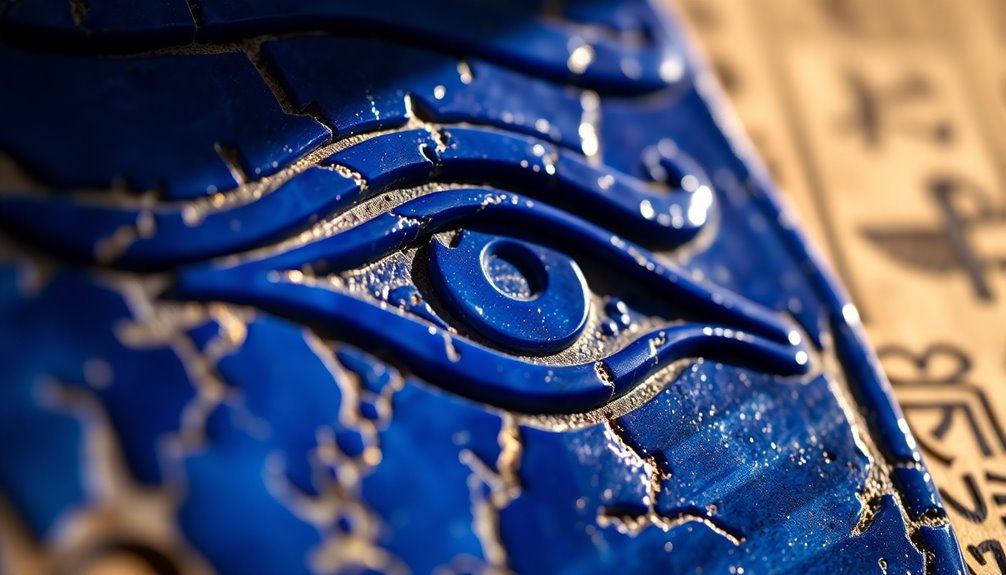
The Eye of Horus, steeped in ancient Egyptian mythology, embodies the profound concepts of healing and protection. This iconic symbol represents the restoration of Horus's sight after a fierce battle, making it a powerful emblem of renewal.
Each part of the Eye of Horus corresponds to human senses and brain functions, illustrating its depth. The right side symbolizes smell, while the pupil represents sight. The eyebrow is linked to thought, the left side to hearing, the curved tail to taste, and the teardrop denotes touch.
Interestingly, the Eye of Horus consists of six distinct parts, each with mathematical significance, representing fractions that collectively sum to 63/64—symbolizing imperfection. This connection to the lunar cycle further emphasizes the themes of renewal and the cyclical nature of life in ancient Egyptian belief.
As a cultural icon, the Eye of Horus has transcended time, influencing various art forms and modern interpretations. It serves not only as a protective amulet against negativity but also as a source of spiritual insight.
Symbolism and Anatomy of the Eye
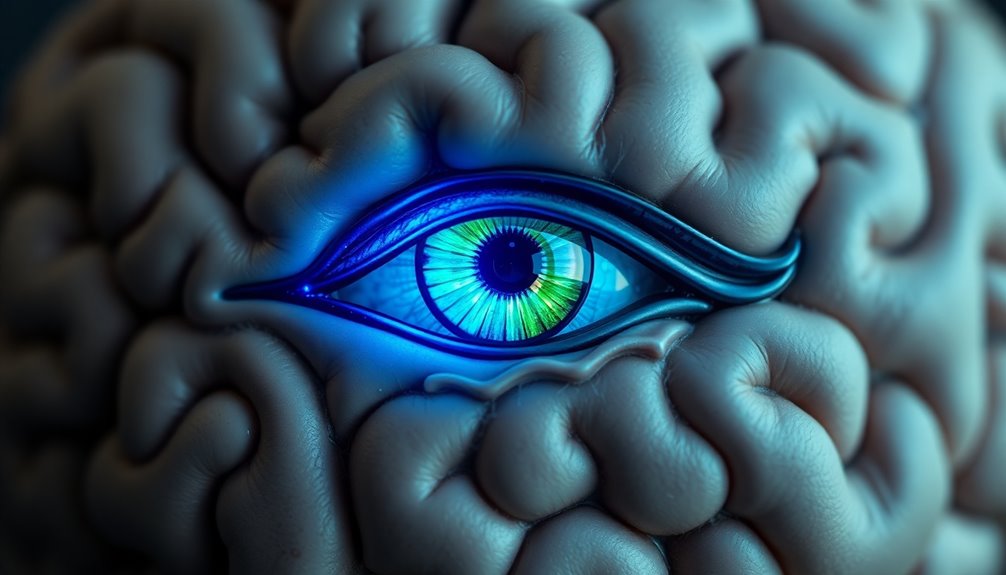
While exploring the Eye of Horus, you'll discover a rich symbolism intricately linked to human anatomy and sensory perception. This ancient Egyptian symbol embodies key aspects of our human senses, demonstrating a profound understanding of the body's functions.
Each part of the Eye of Horus corresponds to specific senses, illustrating the ancient Egyptians' insight into anatomy:
- The right side signifies smell.
- The pupil represents sight.
- The teardrop symbolizes touch.
The design reflects not just sensory pathways but also cognitive abilities, as it serves as a metaphor for wisdom and protective powers. The intricate connections between its components highlight the significance of these senses in our daily interactions with the environment.
Moreover, the Eye of Horus encodes advanced knowledge of human anatomy, showcasing how the Egyptians integrated art and science. This symbol isn't merely a protective emblem; it encapsulates the essence of human experience, reflecting the importance of our sensory perceptions in traversing the world around us.
Modern Relevance of the Eye of Horus
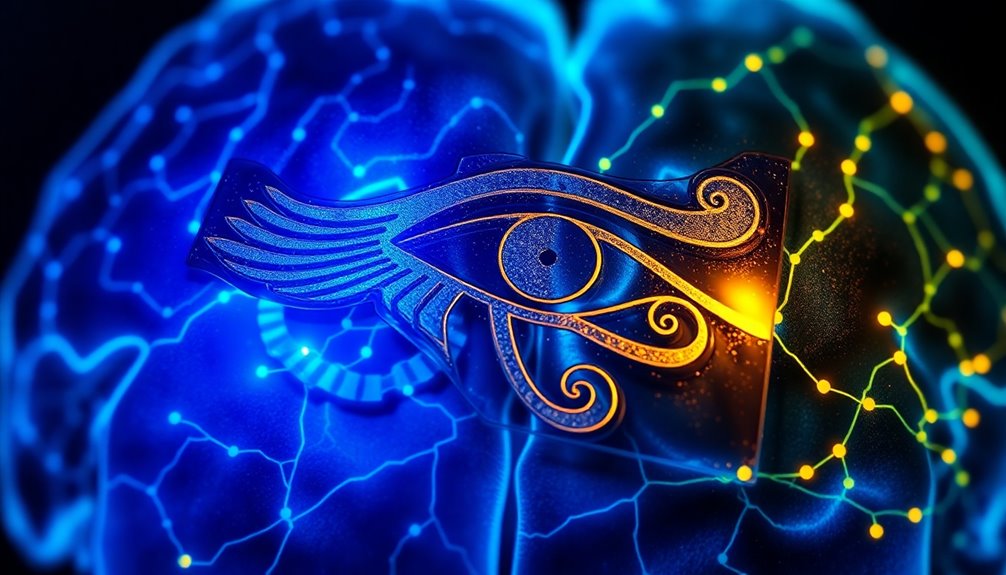
In today's world, the Eye of Horus remains a powerful symbol that resonates with many people seeking protection and enlightenment. This protective symbol is often worn as jewelry to ward off negativity and promote good health. Its influence spans contemporary spirituality and art, blending ancient wisdom with modern interpretations of consciousness and enlightenment.
| Aspect | Description |
|---|---|
| Symbolism | Represents spiritual protection and healing |
| Cultural Use | Talismans against the evil eye across cultures |
| Psychological Role | Reminds us of mind, body, and spirit interconnectedness |
| Holistic Approaches | Encourages overall mental well-being |
| Resurgence of Interest | Inspires exploration of self-awareness in today's fast-paced world |
As you explore the Eye of Horus, you'll find it's more than just a symbol; it's a reminder of our interconnectedness and the importance of holistic approaches. Embracing this ancient wisdom can help you navigate your own consciousness, fostering personal growth and spiritual protection against life's challenges. Additionally, this symbol can serve as a catalyst for continuous learning that encourages individuals to seek deeper understanding in their personal and spiritual journeys.
Frequently Asked Questions
What Does the Eye of Horus Brain Mean?
The Eye of Horus represents a complex blend of sensory functions and cognitive potential.
When you look at it, you see a symbol of interconnectedness among the senses, with each part corresponding to specific functions.
It's not just art; it reflects a deep understanding of anatomy and mathematical sophistication.
This emblem also suggests mental perception and healing, hinting at the ancient Egyptians' insights into cognitive restoration and overall well-being.
What Does the Eye of Horus Symbolize?
When you think about the Eye of Horus, it's more than just a symbol; it's a powerful emblem of healing and protection.
This ancient icon connects you to themes of sacrifice and restoration, reflecting the battles and triumphs of the human spirit.
Each component represents your senses, reminding you of your innate connection to the world.
The Eye of Horus invites you to embrace spiritual insight and awareness in your own life.
What Does the Bible Say About the Eye of Horus?
The Bible doesn't mention the Eye of Horus at all. This symbol, rooted in ancient Egyptian mythology, isn't recognized in biblical texts.
Instead, the Bible focuses on symbols like the eye of the Lord, which conveys spiritual vision and divine protection.
While some people might draw parallels between the Eye of Horus and biblical themes, these connections are more interpretative than doctrinal, highlighting the distinct cultural beliefs of each tradition.
Is Horus Eye Good or Bad?
The Eye of Horus is generally seen as a good symbol.
It represents protection, healing, and good fortune, often used as an amulet to ward off evil.
While it has ties to themes of conflict, like the battle between Horus and Set, its overall message is about triumph and restoration.
You can embrace it as a symbol of enlightenment and spiritual insight, reflecting balance and harmony in your life.
Conclusion
In exploring the Eye of Horus and the pineal gland, you've uncovered a fascinating fusion of science and symbolism. This ancient emblem, steeped in spirituality, still sparks curiosity today. By embracing this enigmatic eye, you connect with a mesmerizing history that transcends time. So, whether you seek insight or inspiration, remember the powerful parallels between perception and the pineal gland. Discover the depth of this divine design; your mind's eye might just awaken to new wonders!
